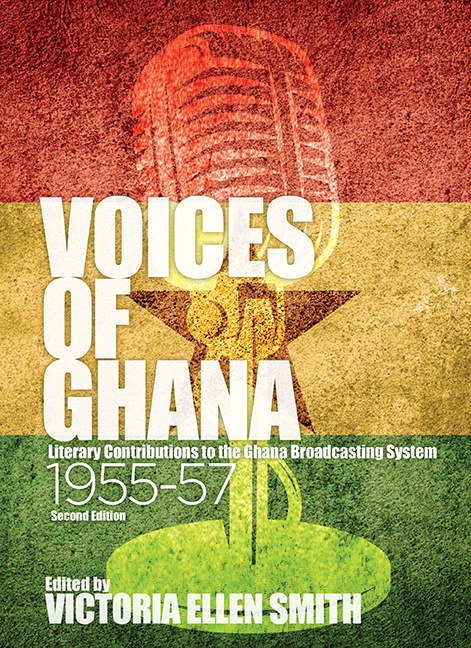A Note of History
Published online by Cambridge University Press: 02 August 2019
Summary
A brief introduction to this anthology of contemporary writing in Ghana is perhaps necessary, although those who prefer their authors to speak for themselves may omit it altogether. To say that the collection fills a long-felt want is no mere figure of speech. There is, in fact, nothing at the moment in print, apart from political and biographical writing, led by Dr. Nkrumah's Autobiography, which attempts to portray, in however modest a way, the life of the people of one of the world's newest sovereign states, and the ninth Dominion. Here we have no Cyprian Ekwensi, no Camara Laye, no Amos Tutuola. Why is this? To understand, it is necessary to delve a little into the past.
The first literary development known to history took place in 1763 when 500 Fante words were consigned to writing by the Rev. W. J. Muller. He was followed by a Danish African, the Rev. Christian Protten, who made a Fante grammar [book] in the succeeding year. After this, the impetus waned. It was not until another century had passed that a Fante primer was produced (in 1860). Again, the effort came from missionaries, for the foundation of all African literatures is due to the desire for evangelisation,—first the translation. of the Gospels, then devotional book and hymns, primers and dictionaries. The English missions never believed greatly in literary work—they believed in works, and Freeman, their great apostle, could not even speak Fante, although he was a man of colour, and worked in the Gold Coast for 40 years.
The main impetus in the written word came from the Germans whose missionaries from Basel were the pioneers in most of the Ghanaian languages. Of these, Twi is the most important, since it is spoken by three million [people] in the forest area, and acts as a lingua franca in the markets of the North. Under the name of Oji, it was reduced to writing in 1842—not an easy task since it is a phonetic language, with simple monosyllables that can be pronounced in four or five different ways, each with a different meaning. (It is this quality of singing that makes drum language possible.) As with all other African languages, it is elliptic and suggestive, strong in concrete words, weak in abstractions and generalisations.
- Type
- Chapter
- Information
- Voices of GhanaLiterary Contributions to the Ghana Broadcasting System 1955–57, pp. 47 - 51Publisher: Boydell & BrewerPrint publication year: 2018

